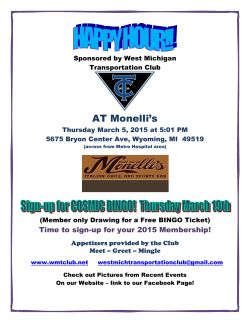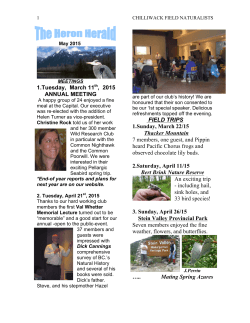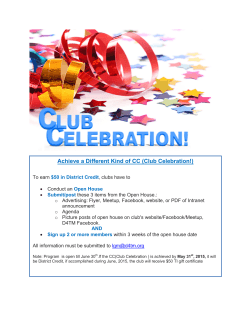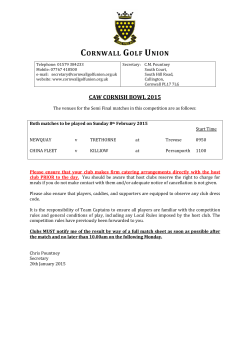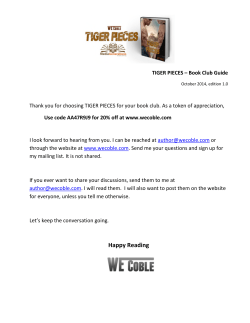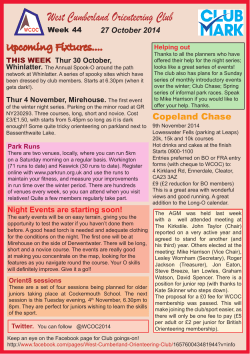
April 2015 - JOHNSON COUNTY RADIO AMATEURS CLUB, Inc.
JOHNSON COUNTY RADIO AMATEURS CLUB, INC. P.O. Box 93 Shawnee Mission, KS 66201 FEEDBACK APRIL 2015 Hams in Space -- Harold "Van" Van Daveer, KØHCV Slow Scan Television from the ISS SSTV stands for Slow Scan Television. Slow Scan TV is the process of receiving a picture one line at a time over a period of several minutes. It is a fairly simple process to receive a picture. All you need to do is connect the audio output of your receiver to the input of your soundcard and use a program capable of decoding the picture. This can also be accomplished by holding the computer microphone close to the speaker of the radio. It becomes a little more complicated if you want to transmit an SSTV picture. There are several free programs available that allow you to send and receive slow scan pictures using your radio and computer sound card. One of these is MultiPSK. This is a good program because it can decode many different types of data transmissions besides SSTV. Another one dedicated to receiving SSTV pictures is RX-SSTV by ON6MU. This is a freeware program and works very well. SSTV can be used on the ham bands and 14.230 MHz on the 20 meter band is designated as an SSTV frequency. You can often find other hams conversing with pictures on that frequency. see SSTV on page 10 APRIL MEETINGS April 10 – VHF Shootout -- Lon Martin, KØWJ (Note 6:00 start time) April 24 – Integrating SDR into your Shack - Eddy Paul, KYØF The Johnson County Radio Amateurs Club normally meets on the 2nd and 4th Fridays of each month at 7:30 PM at the Overland Park Christian Church (north entrance), 7600 West 75th Street (75th and Conser), west of the Fire Station. Much of the membership travels to the Pizza Shoppe at 8915 Santa Fe Drive for pizza buffet and an informal continuation/criticism/clarification of the topics raised at the meeting ... or anything else. Leave the church, turn right (west) on 75th. Turn left (south) on Antioch. Turn right (west) on Santa Fe. Pizza Shoppe is just past the Sonic on your left. IN THIS ISSUE 1 - SSTV and the ISS 2 - President's Corner Editorial Notes 3 - Local Meetings and FM Nets 4 - February Meeting Minutes 6- Hambone and the DED Jaime Charlton - ADØAB 9 - VHF Shootout Announcement - Field Day Announcements 11- April Calendar -1- -> FEEDBACK <- PRESIDENT’S CORNER I want to thank Club vice president, Aaron Bill Gery, KA2FNK, President Boots, AAØRN, Aaron Boots, AAØRN, Vice President for stepping up Ted Knapp, NØTEK, Secretary and leading the Cal Lewandowski, KCØCL,Treasurer Club meetings for the last * * * several weeks Chip ACØYF and Deb KDØRYE Buckner, Editors while I was busy with Lenten All email address are available at w0erh.org activities. Spring is looking to be -----------------------busy for everyone with many So What Are YOU Doing? club activities on the plate. The In December, Herb Fiddick, NZØF faced the problem of remote World War I and Ensor requests operation of special event station WW1USA. That Herb solved and public service events will fill the problem is hardly news. Rather than stop there, however, our weekend calendars. he asked himself if there might be someone else who could Lon Baker, KØWJ has gotten the learn from his experience. The resulting two-part article for club shirt project back on track. FEEDBACK not only introduced the idea of remote operation Special thanks are due to new to many new hams, but has drawn praise from old hands from ham Alex Plassmeyer, KEØCVD, far beyond Johnson County for ideas on sourcing shirts and A couple of months later, "Van" Van Daveer, KØHCV saw that the hams who volunteered for a the International Space Station would be transmitting slow- shirt committee. scan television images to Earth. He offered the images to the Don Warkentien, WØDEW is FEEDBACK and--with a little urging--was persuaded to talking about Ensor campfires, introduce the basics of slow scan amateur television to our again. Keep an ear open on the readers. repeater for his announcements. Someone is going to show up at the VHF shootout with a – Bill Gery – WA2FNK homebrew antenna that puts the commercial products to shame. How--and why--did he design it the way he did? Will you understand why? Might there be a ham who doesn't? The online Universal Licensing Service database shows that the FCC has granted 533 Technician licenses to Kansans since January 1, 2014. Even if you think that someone else knows more about a topic than you do, you know more--and can help--these new hams. A publication of the Johnson County Radio Amateur Club, Inc. What are you doing? Tell us--and them--about it. -- Chip and Deb -2- LOCAL MEETINGS AND FM NETS SUN AM MON TUE WED 0:00 Paul Revere 146.94- (88.5) THU FRI 11:00 Quarter Century Wireless Assn - RC's Restaurant, 135th & Wornall 18:00 18:45 Miami County D4 ARES/Paola 147.360- (151.4) 18:30 4th: KCDX Club @ Better Homes & Gardens Realty, 8101 College Blvd, #100 OPKS JoCo ARES Simplex 146.450 19:00 Wheat State Net/Paola 147.360- (151.4) 145.47- (151.4) JoCo ECS JoCo ARES 145.29+ (151.4) 1st: Clay Co ARC @ Liberty Hospital (Dialysis Ctr Lower Level) 2nd: Indep. FM ARC, St. Matt's UMC, 2415 R D Mize Rd., Indep, MO 2nd: Douglas Co ARC @ Douglas Co Fairgrounds Bldg#1 2nd: Wheat State Wireless Assn @ Paola Fire Station SAT 07:00 - Santa Fe Trail ARC @ Perkins, Santa Fe E. of I-35, Olathe 09:00 - Ray/Clay ARC - Bargain Town (Hwy 10&13), Richmond, MO Jayhawk ARS 147.150+ (151.4) 3rd: Santa Fe Trail ARC Meeting and 1st: Pilot Knob ARC Fun Night @ Faith @ Leavenworth Co Technologies, Courthouse - Emer. 11086 Strang Line Rd, Lenexa Op. Ctr. 3rd: Heart of Amer RC - Red Cross HQ, 211 W Armor, KCMO 3rd: Testing @ Community Christ, 63rd & Manning, Raytown 19:30 Swap and Shop 145.17- (151.4) JoCo SATERN 145.13- () Pilot Knob ARC 147.00- (151.4) 20:00 Douglas Co ARES 146.76- (88.5) Raytown ARC 145.17- (151.4) Clay Co ARC 147.33+ () 20:30 21:00 Right Wing Wacko Net 146.97- () Clay Co ARC 146.79- (107.2) 4th: Raytown ARC @ basement of Comm of Christ, 63rd & Manning, Raytown 2nd/4th: JCRAC "Regular Meeting" @ OP Christian Church, 7600 W 75th St. OPKS Johnson Co RAC 443.725+ (151.4) Johnson Co RAC 145.29+ (151.4) VA Casual/Ham Roundtable 443.500+ (151.4) Jackson Co ARES Digital Training 146.97- () Independence RACES 145.31- () Pilot Knob ARC 147.00- (151.4) 145.13- () KC Southside ARC Assoc of the Blind 147.12+ () ARC Santa Fe Trail 147.375+ (156.7) ARC 147.24+ () Ray/Clay ARC Swap and Shop 147.09+ () 2nd/4th: JCRAC "Annex Meeting" @ Pizza Shoppe, 8915 Santa Fe Dr., OPKS Local nets, meetings and testing sessions are posted as the FEEDBACK editor becomes aware of them. A net is "local" if it can be heard on an attic VHF/UHF J-pole near I-435 and US69. Boldfaced type indicates that FEEDBACK heard the net. Plain type indicates that someone reported it to the FEEDBACK or referred to it on Larry's List, but the FEEDBACK has not confirmed its presence. A meeting is local if the person who prepares the calendar thinks that it is local. -3- Johnson County Radio Amateurs Club - March 13, 2015 Meeting Minutes Meeting Date: Friday March 13, 2015. The meeting Started at 7:30PM. Attendance: Self introduction with name and call sign. 27 signed the check in sheet. This was followed by the Pledge of Allegiance. The Minutes from the February 27, 2015 meeting were read and accepted with 1 opposed vote. The Treasurer’s report, as follows, was read and accepted unanimously. Cash on Hand $ 282.11 Checking Account $ 530.08 Savings Account $ 7,536.26 Total $ 8,348.45 Repeater Operating Reserve $ 763.87 Memorial Fund $ 225.00 Active Members 139 Old Business: Repeater Update – The Last part of the new 2m Repeater arrived and has been installed. VHF Indoor Shootout is being planned for the 1st meeting in April. Tentative start time is 6:00 PM. More details to follow. Field Day 2015 – June 27-28, 2015. The organization team is looking at having Club members wear matching shirt so they can easily be identified by visitors. Club Shirt Update – Lon Martin, KØWJ gave a short presentation on some information he collected. Lon reported an order of 50 shirts would cost $27 each. This would include name and call sign embroidered on the left side of the shirt and using the current Club Logo Patch attached on the right side. Shirts would be safety yellow in color. Single shirts orders would jump to $42 each. A discussion followed and the following idea was put together. o The color safety yellow was not popular and Teal was a more popular choice (Blue, Black and Red were also brought up as possibilities). o All shirts should have a pocket and be a T-shirt, Polo Shirt, and Button Down Shirt. o Using the Club’s Logo Patch was a good idea but some felt it might feel stiff or cause wrinkles after repeated washings. Some wanted the option of an embroidered Club Logo. o Have standard name tags made with members Call Sign and Name. After this discussion Alex Plassmeyer, KEØCVD (a new Ham and making his first visit to our meeting) offered to help source shirts for the Club. The club accepted his offer through a unanimous vote. An update will be provided at the next meeting. Thank you Alex. New Business: None. Reports: 6 m – None. 10 m SSB Roundtable – 4 participated on March 12. 440 Wheat Shocker net – 17 check-ins on March 11 and 22 check-ins on March 4. 2m Wheat Shocker net – 26 check-ins on March 12 and 25 check-ins on March 5. Licenses Anniversary – None Birthday’s – None Silent Key’s – None HF Activity – Island off the coast of Australia. Announcements: Ararat Shrine April 18, 2015. Hamclass.org Technician Class April 4 and 11 at the Wyandotte County EOC. ECS Protocol Training March 14. Olathe Marathon April 18, 2015. MS Walk April 11, 2015. Campfire at Ensor on Saturday March 14. Watch Larry’s List for upcoming events. Business meeting adjourned at 8:16 PM Program: The Program for this meeting will be "The Lost art of modifying Radios" by Dennis Baker KEØQM. Submitted by Ted Knapp, NØTEK, Secretary. -4- Johnson County Radio Amateurs Club - March 27, 2015 Meeting Minutes Meeting Date: Friday March 27, 2015. The meeting started at 7:30PM. Attendance: Self introduction with name and call sign. 43 signed the check in sheet. This was followed by the Pledge of Allegiance. The Minutes from the March 13, 2015 meeting were read and accepted with 1 opposed vote. The Treasurer’s report, as follows, was read and accepted unanimously. Cash on Hand $ 330.11 / Checking Account $ 370.04 / Savings Account $ 7,536.26 / Total $ 8,236.41 Repeater Operating Reserve $ 768.87 / Memorial Fund $ 225.00 Active Members 140 Old Business: Repeater Update – Both are working well! As a reminder the new 2m Repeater has a 3 minute timeout feature. This repeater no longer has a courtesy tone so you must wait until the repeater drops (makes that “Ker-chunk” sound) before Keying the mike so it can re-set itself. VHF Indoor Shootout is April 10, 2015 at 6:00 PM inside the Church (our regular meeting location). Rules and more information are available on the website. Field Day 2015 – June 27-28, 2015. Looking for someone to organize/arrange the Food. Also, is there any interest in a Fox Hunt sometime that weekend? See Jay Greenough, WJØX if interested. Club Shirt Update – Alex Plassmeyer, KEØCVD gave a presentation on what he has found. Teal colored shirts over all three styles are hard to find. Navy or Gray are easier to find in all three style options. Cost for the “blank” T-shirts are in the $5 to $6 range, Polo shirts are in the range of $7 to $14 and Button-down shirts are in the range of $9 to $14. Screen print and/or embroidered Logo will cost extra depending on the number of shirts ordered. After a short discussion it was suggested that a small team be organized to make a final recommendation to the club. Team members will be Alex Plassmeyer KE0CVD, Emily Klein (Alex’s girlfriend who works for a shirt distributer), Lon Martin K0WJ, Eddy Paul KY0F, and Cal Lewandowski KC0CL. WW1USA Special Event Station May 9-10, 2015. Herb Fiddick, NZØF reported that currently the Santa Fe Trail Club is organizing this event however the leader needs to withdraw. Herb was wondering if our Club would take the lead for this date. We would then either trade with them on our event in December or another group would take the December event. As a reminder, the May event is Mother’s Day weekend. After a short discussion it was agreed upon to take this event. New Business: Larry Woodworth, WØHXS manager of the Ensor Park and Museum has asked the Club if we would be available to be Ensor Tour Guides as the Museum would like to expand the number of guides available to give tours to the public. After a short discussion a motion was made, seconded and a subsequent unanimous vote followed. The Club owns an Automatic Antenna Tuner that is no longer working properly. This Tuner will need to be used for the WW1 event in May. It was suggested that we purchase another Tuner. After a short discussion a motion was made to purchase a new Turner (not to exceed $300). The motion was seconded and a subsequent unanimous vote followed. Reports: 6 m – None. 10 m SSB Roundtable – 5 participated on March 26. 440 Wheat Shocker net – 21 check-ins on March 25 and 18 check-ins on March 18. 2m Wheat Shocker net – 24 check-ins on March 26 and 27 check-ins on March 19. HF Activity – CW on 17m to Cuba, democratic Republic of Congo. Announcements: Ararat Shrine April 18, 2015. Hamclass.org Technician Class April 4 and 11 at the Wyandotte County EOC. Olathe Marathon April 18, 2015. MS Walk April 11, 2015. ECS Net Control Training March 27. W1AW WAS Award applications are now available on the ARRL website. Watch Larry’s List for upcoming events. Business meeting adjourned at 8:23 PM Program: The Program for this meeting was a presentation and demonstration on Raspberry Pi by Aaron Boots AAØRN. Submitted by Ted Knapp, NØTEK, Secretary. -5- A Hambone and Elmer Story Hambone and the DED -- Jaimie Charlton, ADØAB “Dude, what are you doing? You know you’re not supposed to be prowling around in Uncle Elmer’s stuff without his permission!”, shouted Hambone, causing Dude to jump like a startled cat. “Don’t sneak up on me like that. You almost scared me into the middle of next week, and I do have Uncle’s permission, sort of. I asked him if he had a USB charging cord for my phone. He said he did and I could help myself to it down here in his workshop. That’s what I’m doing. So, there!” “Dude, the charging cords are over by the window, so why are you poking around here?", asked Hambone. “Well, I, I, didn’t see them,” replied Dude, grasping for a better reason to be looking through his Uncle’s private cabinet. “But I noticed this door was unlocked so I thought they might be in here. Look, some of this stuff is so ancient. This box of weird stuff is marked 1965. Do you suppose Uncle had a pet dinosaur back then?” He added trying to change the subject. “No, I didn’t! And who said you boys could go through my stuff?” Boomed the large voice of their Uncle Elmer who just walked into his workshop. “And where did I say the cords Ignoring Dude's attempt at were?” humor, Elmer continued. “By, by the window. I must have “Originally, Shadow Light was a missed them,” stuttered Dude, stealth project. It was based on some principles of coherent unpersuasively. electromagnetic radiation discov“But Uncle, what is this box full of ered by Albert Einstein. But it weird parts for?” Asked Ham- wasn’t until the early 1950s that bone after an awkward silence. the mathematical basis for Both boys had learned from masers was discovered and experience the best way to deflect physical units actually built. After their Uncle’s wrath is to ask him a that, the scientific community technical question. exploded with ideas involving coherent extremely high The project was called Shadow frequency waves. One of those Light but we mostly called it ideas was a means of creating D.E.D. artificial darkness so hence the name, Shadow Light. But, the “Well, that is what’s left of a top final prototype looked a lot like secret project that actually began an oversized diode so we during the Cold War and lasted renamed it DED for Dark Emitting well into the 1960s,” explained Diode. Unfortunately, it also Uncle Elmer, taking the bait and augured the fate of the project.” settling onto his workbench stool. “The project was called Shadow “Uncle,” interrupted Hambone, Light, but we mostly called it “what’s a maser?” D.E.D. Towards the end, we “Oh, a maser is the precursor of actually had moved from the the laser. It amplifies very short theoretical physics to a working microwaves using the same prinmodel and were even making ciple as lasers use to amplify light. plans to put it into production. The War Department saw military But then one day we were applications for artificial darkinformed that the project had ness and put together a team of been discontinued, all funding about 10 engineers and scientists, stopped. We were ordered to including me, to make it work. destroy all models and We were civilians, but we might documents, collect our final as well have been in the military paychecks and leave. for all the rules we had to follow. We followed our orders except I Our thinking at the time was since managed to save a few parts and light is really just very short radio papers in this shoebox. waves, we should be able to “But Uncle, what did DED do?” cancel it out by supplying radio waves of the same frequency but pleaded Hambone. “What did DED do, what did DED 180 degrees out of phase.” Looking like they both just discovered a zombie ghost, Dude spoke first. “I was just looking for that charging cord you said I do. That’s fun to say,” added Dude. “That doesn’t sound too hard.” could have.” see Hambone on page 7 -6- from Hambone on page 6 “But Uncle Elmer, these parts Dude. “It was and is. Remember, a don’t look like radar parts,” “Not exactly. On paper at least, working laser hadn’t been observed Hambone. we found a way to cause a dark invented yet so we were trying to “They aren’t,” replied Elmer. “We area, or shadow, by capturing and work well ahead of the actual thought we were at an impasse, negating photons. After a lot of science. We started by trying to our goal of invisibility, even if only experimentation, we were able to make objects invisible to radar to radar, was beyond our reach. build a working prototype that microwaves. The idea was a Then, out of the blue, we looked a little like a spotlight. receiver inside a target, such as receiveda scientific paper, of That’s where the project’s name an airplane, would detect the sorts. The name of the author came from. But this was not very enemy’s radar signal. Our was redacted as were any useful in broad daylight.” Shadow Light transmitter would identifying footnotes and “Why is that?” asked Dude. then emit a pulse of the same references. But, it completely frequency and strength, but 180 changed the course of our project. “Well, you couldn’t see the target, degrees out of phase and cancel The original document was but you knew it had to be inside the reflection. That proved to be destroyed, but my notes here give that black cloud-like shadow area.We found, however, it was easier said than done.” some idea what it contained. effective in the jungle where the “Why was that?” asked Dude. It explained that although we nor- Viet Nam war was fought. “First, it was very difficult to mally think of light--yes, we are Snipers loved it. Here. Look at accurately determine the fre- talking about light not micro- these photos.” quency and phase of the incoming waves--as electromagnetic waves, “That’s amazing!” Said Hambone. radar pulse. Sure, we could get it can also be thought of as tiny “These pics are the same as the close, but not close enough. Even particles called photons. I know other ones except there are when we did identify the signal, it this is common now, but it wasn’t soldiers everywhere. Hey, there was difficult to configure our back then. The paper explained you are.” transmitter to generate a similar, that although all photons travel at but out-of-phase, signal fast the same speed, they have “I didn’t know you were in Viet enough. We had plenty of sam- different energies depending on Nam,” exclaimed Dude. “You were ples because the Russian radars their electromagnetic wave fre- so much skinnier, then.” sent steady streams of pulses. quency. They also have a prop- “Yes, we discovered that shadow But, since each lasted only a few erty called spin. Spin would prove light was very effective at hiding microseconds and changed fre- useful because it always has a men and equipment by creating quency, we had way less than 0.05 magnitude of +1 or –1 sometimes natural looking shadows in a It also microseconds to identify and called up or down. This gave the jungle environment. project a whole new direction. worked well in buildings and cancel it. If we took any longer anywhere that you might expect than that, enough of the pulse was reflected back for the radar Just like Harry Potter's to find natural shadows.” to see us. invisibility cloak, exclaimed “But Uncle, I still don’t understand how it works,” asked We tried other schemes such as Dude. Dude as he studied the parts in ground-based wave cancellers as the shoebox. well as anticipatory and delayed pulse generators. These last two We thought that rather than try to “The secret lies in the quantum were somewhat successful and cancel out a microwave reflection, physical effect called entangleenjoyed some deployment. They we could actually make the target ment. Entanglement is a condidid not hide the target, but made optically invisible by capturing or tion that can be made to exist it difficult to determine its canceling photons.” between two or more subatomic “Wow! Just like Harry Potter’s location.” See HAMBONE on page 8 invisibility cloak,” exclaimed -7- From HAMBONE on page 7 particles, such as photons, in which they act as if they were a single entity or singlet. That is, anything you do to one is immediately felt by the other. No one knows exactly the mechanism behind entanglement, but the effect does not weaken with distance and acts faster than the speed of light.” After pausing for dramatic effect, Elmer continued. “Our scheme was to generate a flood of entangled photon pairs of various energies or wavelengths. Then, strip away one photon from each pair leaving a flood – okay,half a flood - of unpaired photons. The unpaired photons were directed towards the area we wanted to shadow. Because these lone photons were previously paired, they “wanted” to be paired again. Consequently, they would be attracted to the ambient light photons and entangle them. The result would be new pairs of photons with new energies. New energies translate into new wavelengths. We selected our entangling photons such that the energies of the new pairs put them into the ultraviolet wavelengths which are invisible to the human eye.” Ignoring his little brother and getting serious, Hambone asked, “How exactly did you create the entangled photon-pairs?” “That was not easy. When we received that mysterious paper, we also received about a hundred of what appeared to be transparent crystals. We discovered that when a beam of coherent light entered one side of a crystal, it emerged as two beams of entangled photon-pairs from the other. One beam contained only +1 spin photons and the other beam contained only photons with spin of –1. I've never seen anything this cool, replied Hambone. Oh, look at the time, I’ve got to go to a meeting. Please put this stuff away and lock the cabinet.” Said Elmer as he dashed out of the workshop.Hambone started to put the parts back in the shoebox when Dude stopped him. “Hey, let’s see if we can make this work.” “No, Uncle Elmer said to put it away and that’s what I’m going to do.” “It won’t hurt to just play with it a little. Let’s just see if this old-time laser diode still lights. I’ll get some batteries.” Said Dude “Well, okay,” said Hambone, curiosity getting the best of him. “Be careful not to break anything.”The excitement of doing something behind their uncle’s back drove the boys to a heightened frenzy of wiring, soldering and assembling. After an hour, they had more or less rebuilt their uncle’s shadow light and were ready to test it. We never determined the origin of the crystals or exactly their composition. They appeared to be birefringent calcite, but we could never quite pin down some impurities. One thing we did notice is that with use, the “Put the batteries in, Hambone, I crystals lost their beam splitting can hardly wait to see this thing work.” properties. The final prototype was pretty “This is going to be so fun, I’ve simple. That little laser diode and never seen anything this cool,” the crystal were mounted on this replied Hambone as he shoved a tiny frame so the laser’s light couple of D cells into the old “That is so cool,” exclaimed passed through the crystal and battery holder. Hambone. “But, why did your then through that spatial “Look!” shouted Dude, “the laser unpaired photons want to link up modulator which is really just a shines green and the modulator is with the ambient light photons?” small LCD display without the doing something.” “The secret is the spin. Paired backlight. The modulator worked “Yeah, but what?” replied by itself and was powered by the photons have opposite spins so, Hambone. “I don’t see any our newly unpaired photons same source as the laser diode. shadow anywhere, but it looks would attract and attach That piece of black plastic was like the modulator is displaying themselves to ambient photons of used to absorb one output beam something. Oh no, it says,” and thus create the unpaired the opposite spin.” APRIL FOOL photons. The lens just spread out “I guess the law of opposites the photons to make the dark - Uncle Elmer attract goes deeper than the birds area larger. and the bees,” said Dude. -8- JCRAC holds its first-ever VHF antenna shootout on April 10 JCRAC will hold its first of what it expects to be annual VHF "shootouts" before its April 10 meeting. The event is open to any licensed ham who can bring a 2m handi-talkie [HT] that he can tune to transmit at 146.43 MHz. A "shootout" is an antenna test or competition. Those interested in a "test" can--within the limits of the rules--learn about the effectiveness of any homebrew or commercial antenna they may have in comparison to the original issue "rubber duck". Those interested in a "competition" will be comparing the results of their best designs against similarly inclined hams. Organizer Lon Martin, KØWJ, told the club that, as a mechanical matter, the club would run the output of an HT directly into an Agilent 8920 RF test set to determine its power output relative to a one watt standard. Then, with antenna affixed, participants will send a signal from the HT to the receive site, which will measure signal strength. The highest signal strength, as adjusted by the normalization handicap will be declared the winner. Official VHF Shootout Rules 1. Any radio regardless of power output. 2. Any antenna that is sufficiently supported by the radio. No handheld antennas of any kind. Counterpoises may be used as long as they are solely supported by the radio. 3. You may orient the antenna any way you want. 4. When asked to transmit, you will depress the PTT button for five seconds at which time the receive site will record the received signal strenght. 5. The highest recorded signal strength will be declared the winner. Jay Greenough, WJØX -- JCRAC Field Day Coordinator Field Day is June 27-28 at Shawnee Mission Park As the largest single weekend of Amateur Radio annually in the US, Field Day has something for everyone. There are new experiences for even the veteran operator – from new digital modes to explore to new antennas and equipment to try to making new friends with visitors on Field Day. The combination of “tried and true” plus “new and different” is what makes this event special. station operations, layout, display, etc. The Public Relations and Publicity bonuses are excellent opportunities for us to carry the message of Amateur Radio to our local communities. We can once again use the GOTA station to help teach newly licensed amateurs how to be active on the air. We want to reach out to community youth groups – such as Girl/Boy Scouts or other youth organizations – to promote Field Day as an education opportunity. The more we promote that Amateur Radio is alive, well and FUN, the greater the return YOUR investment of time. We encourage all Field Day 2015 participants to try something new this year. Challenge yourself and be adventurous. Have you always wanted to try to contact an amateur satellite but never quite Martin went on to say that he had got around to it? Plan and work Between now and Field Day we had enough experience with one of “the birds”. will be reviewing, discussing and JCRAC club members that he felt Are you rusty on passing traffic or looking for your ideas for Field he needed to establish a set of hosting VIPs to your Field Day Day. We need to determine which rules. QTH? There is no better time to and how many stations, layout, polish those skills than the fourth teams for each station plus food full weekend in June. and greeting tent. Come and join -- JCRAC FEEDBACK -There are no rule changes for in being a part of the planning Field Day 2015 which means we group for one of our largest events of the year. can be even more creative with -9- from ISS on page 1 When I found out via Larry’s List that the International Space Station was going to be transmitting SSTV pictures I set about getting ready to receive them. This required two different actions. First, I needed to know when the ISS would be in range and second have my radio connected to my soundcard and an appropriate SSTV program running. I have several satellite prediction programs but for tracking the ISS I went to the ISS website at http://www.issfanclub.com/. This website has current information on space station activities as well as a tracking screen and pass prediction information. be best if they started transmitting once they just came into range. This would give you the best possible conditions to receive the complete picture. Once I knew when to expect the space station to be within range I tuned my transceiver to 145.800 in FM mode and started the RXSSTV program on the computer. There are many different SSTV It starts automatically when it modes and unfortunately the ISS hears the SSTV signal. used a mode (PD180) that Several different things can requires 3 minutes to transmit This makes it happen at this point. If the ISS is one picture. already transmitting a picture difficult to get a complete picture when it comes into range the RX- unless the optimum conditions SSTV program will start receiving described above are met. the picture. However you will only decode the bottom portion of the picture. If the ISS starts transmitting once it is within range, you will begin receiving the picture from the beginning. But unless the station remains in range for the duration of the picture you may only get the first portion of the picture. So the optimum conditions would be for the ISS to pass directly overhead since this would give you the longest possible reception window. Then it would There also is a packet digipeater aboard the ISS that operates on 145.825 Mhz FM. Generally you can digipeat APRS and packet data through this station on any pass where the station is within range and see the results on http://www.ariss.net/. I have even had packet conversations with other stations in the US via this digipeater. But that is for another article. I was lucky that these conditions were met on one pass and I was able to copy a complete picture. On subsequent passes these were not met resulting in getting the first part of one picture and the last part of another. You can see for yourself how these conditions affect reception of the picture. There are two callsigns assigned to the ISS. NA1SS and RS0ISS. The SSTV pictures were sent using the RSØISS callsign as can be seen in the pictures. - 10 - -- JCRAC FEEDBACK -- FRIDAY SATURDAY SUNDAY APRIL 3 4 Missouri QSO Party --> 5 <-- Missouri QSO Party 10 Ozarkcon QRP Conference Stone Catle Hotel, Branson, MO www.ozarkcon.com 11 Ozarkcon 12 Yuri Night HMS Beagle, Parkville MO 17 18 Olathe (Garmin) Marathon Herb Fiddick/Dennis Smeltzer MS Walk - Sporting Park Herb Fiddick 19 Shrine Ham Bash - KCMO VE Testing @ 9am - JoCo Library, 151st and Antioch 24 Independence/EJC CERT Basic Training (Day 1 of 4) 25 Independence/EJC CERT Basic Training (Day 2 of 4) W5YI Testing @ 9am Mid-Continent Library - Blue Springs 850 NW Hunter Drive MAY 1 2 Bull Creek Bike Bash, Springhill, KS Steve Rainey - 11 - 26
© Copyright 2025
